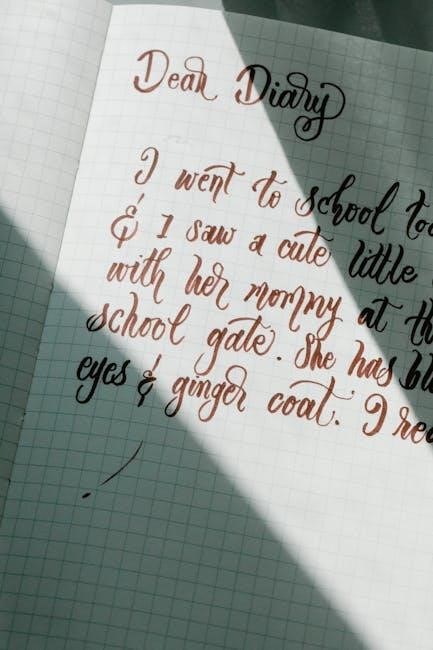the diary of anne frank play script pdf
The Diary of Anne Frank play script brings to life the emotional journey of Anne Frank, capturing her honesty, wit, and determination during WWII. This powerful adaptation vividly portrays the story of eight people hiding from the Nazis, offering a deeply human perspective on hope and resilience in the face of unimaginable adversity.
Overview of the Play and Its Significance
The Diary of Anne Frank play script is a powerful adaptation of Anne Frank’s iconic diary, capturing her emotional journey during WWII. The play, consisting of 121 pages, features a cast of 5 men and 5 women, along with detailed set descriptions and music manuscripts. It vividly portrays the lives of eight people hiding from the Nazis, offering a deeply human perspective on hope, resilience, and the struggle for humanity. The script’s significance lies in its ability to immerse audiences in Anne’s world, making her story relatable and poignant. Its historical accuracy and emotional depth ensure its relevance today, both as a theatrical production and an educational tool for understanding the Holocaust. The play’s enduring legacy continues to inspire new adaptations and interpretations, keeping Anne’s story alive for future generations.
Historical Context of Anne Frank’s Story
Anne Frank’s story is set against the backdrop of World War II and the Holocaust, a period of immense suffering for millions, particularly Jews. Anne, a young Jewish girl, and her family were forced into hiding in Amsterdam to escape Nazi persecution. They lived in a secret annex for two years, during which Anne documented her experiences in her diary. The diary became a powerful historical document, offering insight into life under Nazi occupation and the emotional toll of living in constant fear. After the war, Anne’s father, Otto Frank, dedicated his life to sharing her diary, ensuring her voice would be heard. The play adaptation of her diary brings this historical context to life, highlighting themes of resilience, hope, and the struggle for humanity amidst unimaginable adversity. The story serves as a poignant reminder of the Holocaust’s atrocities and the importance of promoting tolerance and understanding. By focusing on Anne’s personal journey, the play humanizes the victims of the Holocaust, making the history more accessible and relatable to modern audiences. It not only tells Anne’s story but also honors the memories of those who suffered, ensuring their experiences are never forgotten. The play’s historical context underscores the enduring relevance of Anne’s message, encouraging future generations to learn from the past and strive for a more compassionate world; The adaptation also reflects the broader implications of Anne’s experiences, providing a deeper understanding of the Holocaust’s impact on individuals and communities. By transforming Anne’s diary into a theatrical experience, the play offers a unique way to engage with this critical period in history, fostering empathy and reflection among audiences.

The Play Script in PDF Format
The Diary of Anne Frank play script in PDF format is a 121-page document based on the book, offering a complete theatrical adaptation with set descriptions and scene charts for production convenience.
Availability of the PDF Version Online
The Diary of Anne Frank play script in PDF format is widely available online for educational and theatrical purposes. It can be accessed through official websites, online retailers, and educational platforms. Many schools and theaters provide the script as a digital resource for production planning. Additionally, some websites offer free previews or excerpts, while others require purchase or licensing for full access. Ensure that any download or use adheres to copyright laws and respects the intellectual property rights of the publishers. Legal access is crucial to support the preservation and dissemination of Anne Frank’s story. Always verify the source to avoid unauthorized versions and ensure quality.
Key Features of the Play Script
The play script of The Diary of Anne Frank is a powerful adaptation that captures the emotional depth and historical significance of Anne’s story. It retains the core themes of hope, resilience, and humanity from the original diary while adapting them for theatrical performance; The script includes dialogues, stage directions, and scene descriptions, making it suitable for both theatrical productions and educational purposes. Its concise structure ensures that the essence of Anne’s experiences is conveyed effectively. The play script also highlights the struggles of the characters in hiding, providing a poignant portrayal of life during the Holocaust. Its accessibility makes it a valuable resource for schools, theaters, and readers seeking to engage with Anne Frank’s story in a new format.

Structure of the Play

The play is divided into acts and scenes, chronicling Anne’s life in the secret annex. Act 1 introduces the characters and their hiding, while Act 2 portrays the invasion and its aftermath, emphasizing the emotional journey and historical significance.
Act and Scene Breakdown
The play is structured into two acts, each containing multiple scenes that encapsulate the emotional and historical depth of Anne Frank’s story. Act 1 introduces the characters and their life in hiding, focusing on the initial optimism and challenges of living in the secret annex. Key scenes include the family’s arrival, the dynamics between the Frank and Van Daan families, and Anne’s blossoming friendship with Peter. Act 2 intensifies the tension as the group faces betrayal, fear, and loss. Scenes depict the Nazi invasion, the characters’ desperate attempts to escape, and the tragic separation of the families. The breakdown highlights the progression of hope, despair, and resilience, culminating in a poignant conclusion that underscores the human cost of the Holocaust.
Character Analysis and Roles
The play masterfully portrays the distinct personalities and roles of each character, capturing their emotional journeys. Anne Frank, the protagonist, is depicted as a hopeful and resilient young girl, whose diary serves as the narrative voice. Her father, Otto Frank, embodies wisdom and protective care, while her mother, Edith, struggles with worry and resilience. Margot, Anne’s sister, is portrayed as quieter and more reserved. The Van Daan family, including Mr. and Mrs. Van Daan and their son Peter, bring tension and complexity to the group dynamic. Mr. Van Daan’s gruffness contrasts with Mrs. Van Daan’s anxiety, while Peter evolves from awkwardness to maturity. Fritz Pfeffer, the dentist, adds depth with his own struggles. Each character’s role underscores the emotional and psychological layers of life in hiding, highlighting their individual and collective humanity.

Themes and Messages in the Play
The play explores themes of hope, resilience, and humanity amidst oppression, emphasizing the importance of hope and the enduring strength of the human spirit.
Hope and Resilience in the Face of Adversity
The play vividly portrays Anne Frank’s unwavering hope and resilience despite the oppressive circumstances of hiding during the Holocaust. Anne’s diary entries, central to the script, reveal her belief in humanity’s goodness and her determination to find light in darkness. Even as the family faces confinement, fear, and uncertainty, Anne’s optimism inspires those around her. Her famous words, “In spite of everything, I still believe that people are truly good at heart,” encapsulate the play’s theme of hope. The script highlights how resilience becomes a survival tool, not just for Anne but for all characters enduring the Holocaust’s horrors. This theme underscores the human capacity to maintain dignity and hope, even in the most desperate times, making the play a powerful exploration of the human spirit.
The Struggle for Humanity During the Holocaust
The play poignantly captures the struggle for humanity during one of history’s darkest periods. Amidst the Holocaust’s horrors, Anne Frank’s story highlights the fight to preserve dignity, compassion, and hope. The characters, confined in the Secret Annex, face moral dilemmas and internal conflicts, yet they cling to their humanity. Anne’s diary serves as a testament to the emotional and psychological toll of persecution, while also showcasing the resilience of the human spirit. The play underscores how even in extreme suffering, acts of kindness, solidarity, and moral courage prevail. It reminds audiences of the importance of empathy and the enduring need to uphold human values, even in the face of unimaginable oppression.

Adaptation from the Book to the Play
The play script adapts Anne Frank’s diary into a powerful theatrical experience, condensing her emotional journey while preserving the core themes and messages of hope and resilience.
Differences Between the Book and the Play Script
The play script differs from Anne Frank’s diary in its narrative structure and focus. While the book is a personal, introspective account, the play condenses the story into a dramatic format, emphasizing key events and dialogue. The play omits certain diary entries to fit the theatrical runtime, focusing on pivotal moments that highlight the characters’ struggles and relationships. Additionally, the play introduces dialogue and scenes not present in the diary, creating a more dynamic interaction between characters. The stage adaptation also relies on visual elements, such as the Secret Annex setting, to convey the emotional weight of the story, whereas the book relies solely on Anne’s descriptive writing. These changes enhance the story’s dramatic impact while staying true to its emotional core.
How the Play Captures the Essence of the Diary
The play masterfully adapts Anne Frank’s diary into a theatrical experience, preserving the emotional depth and authenticity of her story. Through dialogue and character interactions, the play brings Anne’s inner world to life, showcasing her hopes, fears, and resilience. The intimate setting of the Secret Annex is recreated on stage, emphasizing the claustrophobic yet hopeful environment. Key themes, such as the struggle for humanity and the importance of hope, are vividly portrayed through the characters’ experiences. The play also captures the diary’s emotional authenticity by focusing on moments of joy, tension, and tragedy, ensuring Anne’s voice remains central to the narrative. This adaptation honors the diary’s spirit while translating its essence into a powerful dramatic form.

Downloading and Accessing the Script
The play script is widely available online for educational purposes. Official websites and educational platforms offer the PDF version for easy access and legal downloading.
Where to Find the PDF Version Legally
The PDF version of The Diary of Anne Frank play script can be legally accessed through official sources. Visit the official website of the play’s publisher, such as Dramatists Play Service or Samuel French, which often provide downloadable scripts for educational or theatrical use. Additionally, many educational platforms and online libraries offer the script for purchase or rent. Some schools and theaters also have copies available for their productions. Always ensure to purchase or download the script from authorized retailers to support the creators and comply with copyright laws. Avoid unauthorized websites to maintain the integrity of the work and its legacy.
Steps to Download the Script for Educational Use
To download The Diary of Anne Frank play script PDF for educational use, visit the official publisher’s website, such as Dramatists Play Service or Samuel French. Select the educational license option and provide institutional details for verification. Choose the script from the catalog, add it to your cart, and proceed to checkout. Ensure compliance with copyright by using the script solely for educational purposes. Once purchased, the PDF will be available for immediate download. For assistance, contact the publisher’s customer support team. Always follow these steps to legally access the script and support its creators; This ensures the play’s legacy is respected and preserved for future educational use.

Educational and Theatrical Use
The Diary of Anne Frank play script is widely used in schools and theaters to educate audiences about the Holocaust and promote empathy through Anne’s story.
Using the Script for School Plays or Productions
The Diary of Anne Frank play script is a powerful tool for educational theater, allowing students to explore themes of hope, resilience, and humanity during the Holocaust.
- Schools worldwide adapt the script for productions, fostering empathy and historical understanding among students and audiences.
- The play’s intimate setting and relatable characters make it ideal for student performances, encouraging emotional connection and reflection.
- Educators often use the script to teach about World War II, tolerance, and the importance of preserving Holocaust stories.
Productions help students develop critical thinking and theatrical skills while honoring Anne Frank’s legacy and message of hope.
Study Guides and Resources for Understanding the Play
To deepen understanding of The Diary of Anne Frank play script, numerous study guides and resources are available for educators and students.
- Many websites offer downloadable study guides with scene analyses, character insights, and historical context.
- Multimedia resources, such as video summaries and interactive timelines, enhance comprehension of the play’s themes and events.
- Educational platforms provide discussion questions and activities to engage students in critical thinking about the Holocaust and its impact.
- Some resources include comparisons between the play and the original diary, highlighting key differences and adaptations.
These tools help audiences connect with Anne’s story on a deeper level, fostering empathy and historical awareness.

Cultural Impact and Relevance

The Diary of Anne Frank play script has had a profound cultural impact, raising awareness about the Holocaust and promoting tolerance worldwide. Its universal themes resonate across generations, making it a timeless educational tool and a reminder of humanity’s strength and fragility.
Why the Play Remains Relevant Today
The play adaptation of The Diary of Anne Frank remains deeply relevant today, as its themes of hope, resilience, and humanity continue to resonate with modern audiences. The story serves as a powerful reminder of the atrocities of the Holocaust, ensuring that future generations never forget its lessons. Its exploration of prejudice, tolerance, and survival aligns with contemporary discussions on human rights and social justice. The universal appeal of Anne’s diary, now brought to life on stage, fosters empathy and understanding, making it a vital tool for education and reflection. Its timeless message encourages audiences to confront injustice and value freedom, ensuring its enduring impact in theaters and classrooms worldwide.
Modern Adaptations and Interpretations
Modern adaptations of The Diary of Anne Frank play script continue to evolve, offering fresh perspectives on Anne’s timeless story. Contemporary productions often incorporate multimedia elements, such as projections and soundscapes, to enhance the emotional depth of the narrative. Some adaptations focus on diversifying the cast to highlight the universal themes of the play. Additionally, interpretations now frequently emphasize Anne’s agency and resilience, challenging earlier portrayals that centered solely on her vulnerability. These modern takes ensure the play remains accessible and thought-provoking for new generations. By reimagining the script for today’s audiences, directors and playwrights keep Anne’s legacy alive, making her story a continuing source of reflection and inspiration in an ever-changing world.
The enduring legacy of Anne Frank’s story continues to captivate audiences worldwide. Her diary, transformed into a powerful play script, remains a vital educational tool for understanding the Holocaust.
The Enduring Legacy of Anne Frank’s Story
Anne Frank’s story, as portrayed in the play script, continues to resonate deeply with audiences globally. Her diary, transformed into a theatrical masterpiece, serves as a poignant reminder of the Holocaust’s impact on humanity. The play script, available in PDF format, ensures that Anne’s voice endures, educating future generations about resilience, hope, and the horrors of war. Its universal themes transcend time, making it a timeless educational and cultural resource. The play not only honors Anne’s memory but also underscores the importance of empathy and understanding in a fractured world. Through its adaptation, Anne’s legacy lives on, inspiring reflection and action against injustice and oppression.
The Importance of Preserving Holocaust Stories
Preserving Holocaust stories, like Anne Frank’s, is crucial for educating future generations about the atrocities of war and the loss of humanity. The play script of The Diary of Anne Frank serves as a powerful tool for understanding the Holocaust’s emotional and historical depth. By sharing these stories, we honor the victims and survivors while fostering empathy and awareness. The PDF version of the play script ensures accessibility, making it easier for schools, theaters, and individuals to engage with this vital history. Preserving such narratives helps prevent the repetition of past mistakes and promotes a world that values peace, tolerance, and human rights.